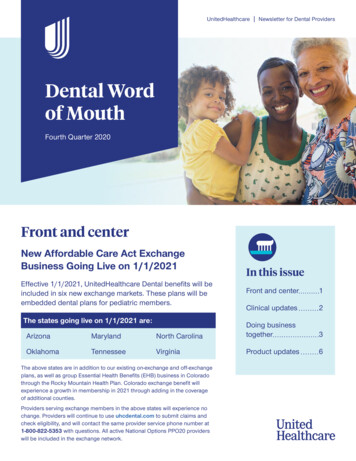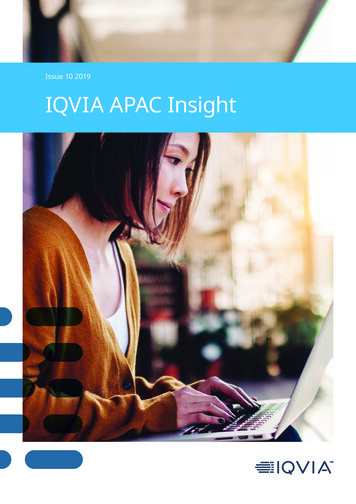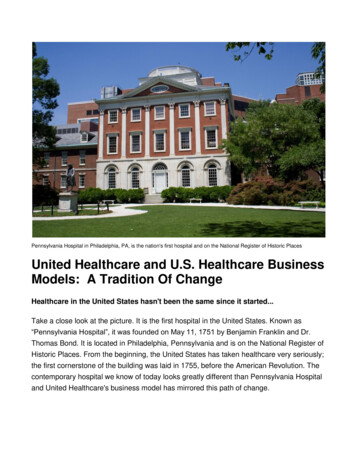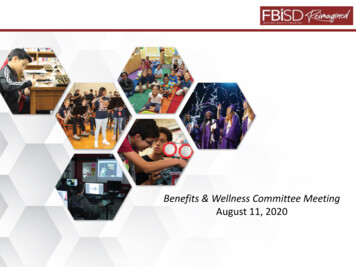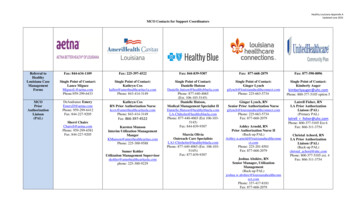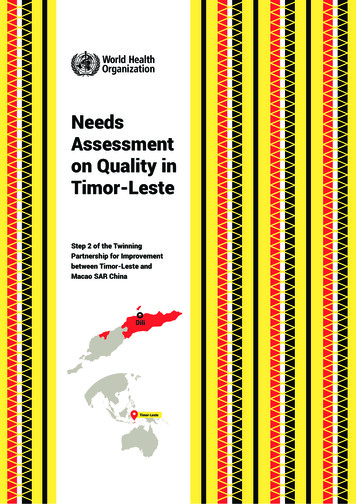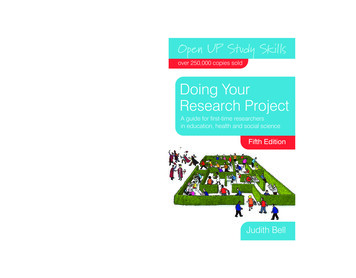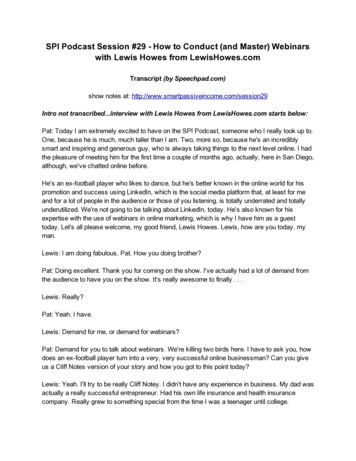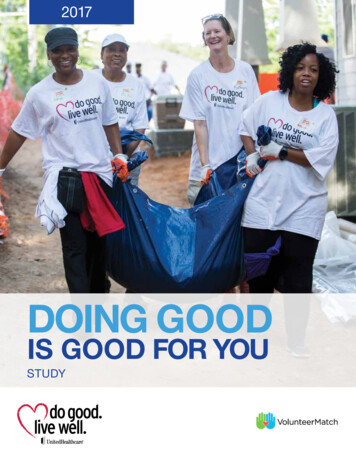
Transcription
2017DOING GOODIS GOOD FOR YOUSTUDY
VOLUNTEERISM CONTRIBUTES TOA HAPPIER AND HEALTHIER LIFEIt could be debated that nothing promises as many personal rewards as volunteeringdoes. More and more studies are demonstrating our physical and mental health canbenefit in many ways through volunteering.The 2017 Doing Good Is Good for You Study, in partnership with VolunteerMatch, onceagain affirms these results: from feeling better to enhancing well-being and providing asense of personal enrichment and satisfaction (in other words, being happier), “doinggood” is good for you. Let’s not forget that people who are happier live longer!“It is one of the most beautiful compensations of this life that no man can sincerelytry to help another without helping himself.”Ralph Waldo Emerson2
Volunteering has a proven positive effect on our physicaland mental healthThree-quarters (75 percent) of people who volunteeredin the past 12 months tell us volunteering has madethem feel physically healthier. More than one-third(34 percent) of those who volunteer find participatingin this activity helps them better manage their chronicillnesses. Compared with those who have notvolunteered in the past 12 months, volunteers aresignificantly more (78 percent) likely to feel theyhave control over their health.Hispanic volunteers are even more likely to reportfeeling physically healthier (72 percent versus 55percent for non-Hispanics) and better able to managetheir chronic illness (48 percent versus 25 percentfor non-Hispanics) through their volunteer activities.A Carnegie Mellon University study found adultsover 50 who volunteered on a regular basis wereless likely to develop high blood pressure, a majorrisk factor for heart attack, stroke, heart failure andmetabolic syndrome.¹The connection between volunteering and mental/emotional health is even more dramatic. Almost allvolunteers note an improvement in mood (93 percent),as well as lower stress levels (79 percent — up from73 percent in our first study completed in 2010), andimproved self-esteem (88 percent). Volunteers believethey are more calm and peaceful and have moreenergy to a greater extent than those who have notvolunteered in the past year.1. Carnegie Mellon University. “Volunteering reduces risk of hypertension in older adults.” Science Daily. 13 June 2013.Of people who volunteered in the past 12 months.88%93%75%78%79%34%note improvedself-esteemfeel they have greatercontrol over their healthand well-beingnote an improvementin moodexperience lowerstress levelsfeel physicallyhealthiercan better manage theirchronic illnesses3
Volunteering also provides intrinsicbenefits, which enrich our livesbeyond our expectationsMost volunteers report an enriched sense of purpose in life (94 percent),an expanded worldview (89 percent) and having learned valuablethings about themselves (88 percent) from their volunteerism. In fact,volunteers have consistently higher scores (by about 15 percent)than non-volunteers on nine well-established measures of emotionalwell-being including personal independence, capacity for richinterpersonal relationships and overall satisfaction with their life.So it comes as no surprise that this healthier, more fulfilled outlookis accompanied by added social benefits. Volunteers note developingfriendships through their volunteer activities (85 percent). They alsoreport having a higher capacity to enjoy socializing compared withthose who do not volunteer.94%of volunteers report anenriched sense of purpose89%of volunteers report anexpanded worldview85%of volunteers have developedfriendships through volunteering“Volunteering is an incrediblyrewarding and important part of my life.It is amazing to see what can be done to help both people and animals in needwhen you get involved with organizations that are dedicated to their mission.The impact of contributing time is real and meaningful — whether it’s helpinga dog find the perfect forever home after living in a shelter for several monthsor assembling a bundle of much needed supplies that will be delivered toan underprivileged child in Philadelphia. The thing about volunteering that isunexpected and never ceases to surprise me is how much it seems to give backto my life as well. I’m grateful to have the ability to dedicate time to these causes,and very appreciative that UnitedHealthcare supports employee involvementwith charitable organizations through volunteering grants, matching donationsand company volunteer opportunities.”Jocelyn Barton, volunteer4
Employers benefit fromhaving healthier andbetter-functioning employeesEmployers benefit in three critical ways when they encourageemployee participation in volunteer activities:1Support forvolunteerismreflects well onthe employerEmployees are happier and healthier, resultingin better productivity and reduced sick time2Employees develop their professional skills3Employees are more engagedAs a result of their volunteer activities, employees believe theydevelop professional skills (87 percent), as well as learn bettertime management (86 percent). Stronger teams result fromvolunteering as employees also believe these activities developtheir people skills/teamwork (92 percent, up from 87 percentin 2013) and strengthen relationships (77 percent).71%Almost three-fourthsof employees who volunteerthrough work report feelingbetter about their employer.Employers play a critical role in ensuring both communityand volunteer needs are metIn a time-starved world, lack of time is the main barrier to volunteering. Employers can help by allowingemployees to volunteer on paid time (91 percent). Employers can facilitate volunteering by providing training(90 percent) and encouraging use of professional skills on volunteer assignments (88 percent). Other waysto support employee volunteering include providing transportation (84 percent), allowing employees to solicitdonations at work (82 percent) and organizing volunteer days/activities (82 percent).But time is not the only barrier these days. Decreased financial support also threatens many nonprofits andcould limit volunteer opportunities going forward. Additionally, nonprofits have specific needs when it comesto volunteers — those willing to make long-term commitments, those with specific skills and those who meetcertain requirements such as availability during the workday (from a survey of 700 volunteer managers,executive directors and other volunteer program professionals across the U.S., Volunteer Screening Trends &Best Practices Report: 2017, Verified Volunteers).5
MAKE A DIFFERENCEBY VOLUNTEERINGVolunteering provides benefits beyond measure. Communities are stronger and volunteers feel good abouttheir contributions. The intrinsic benefits of helping others foster physical and emotional health, as well asa strengthened sense of well-being. Happy, well-adjusted people become more productive, collaborativeemployees, and more supportive, positive family members. And when employers encourage these efforts,they earn greater respect from their employees.“These are trying times, where people feel overwhelmed and don’t know what they cando to help. Don’t underestimate the profound impact one person can have when theyfind a cause or an organization they are passionate about and they spend some timehelping to achieve a common good,”said Shannon Loecher, UnitedHealthcare Social Responsibility, who finds that“Within the work ‘Do Good. Live Well.’ has done, we consistently hear from individualsthat ‘we didn’t think anyone cared.’ It’s in that moment when I realize when you dosomething good for someone else, it really does make you feel good.”Where to beginFinding the right volunteer opportunity is important — look for something that matches your interests,personality and expertise. UnitedHealthcare’s “Do Good. Live Well.” initiative is aimed at inspiring a newlevel of service and volunteerism in communities across the country. “The Do Good. Live Well.” website,dogoodlivewell.volunteermatch.org, offers tools to search and sign up for volunteer opportunities inpartnership with VolunteerMatch. As might be expected, finding volunteer opportunities via a websiteor other online sources has seen the largest growth (from 5 percent in 2010 to 23 percent in 2016).6
Research methodologyThe findings from this study are based on a national survey of 2,705adults age 18 and over conducted by Kantar TNS, one of the world’slargest marketing research firms. Kantar TNS conducted the onlinesurvey between Nov. 29 and Dec. 12, 2016. This study is the third ina recurring research effort for UnitedHealth Group, parent companyof UnitedHealthcare, beginning in 2010 and repeated in 2013.2,705adults surveyedData were weighted to ensure a representative sample of the totalU.S. adult population.7
2017 United HealthCare Services, Inc.
again affirms these results: from feeling better to enhancing well-being and providing a sense of personal enrichment and satisfaction (in other words, being happier), “doing good” is good for you. Let’s not forget that people who are happier live longer!

